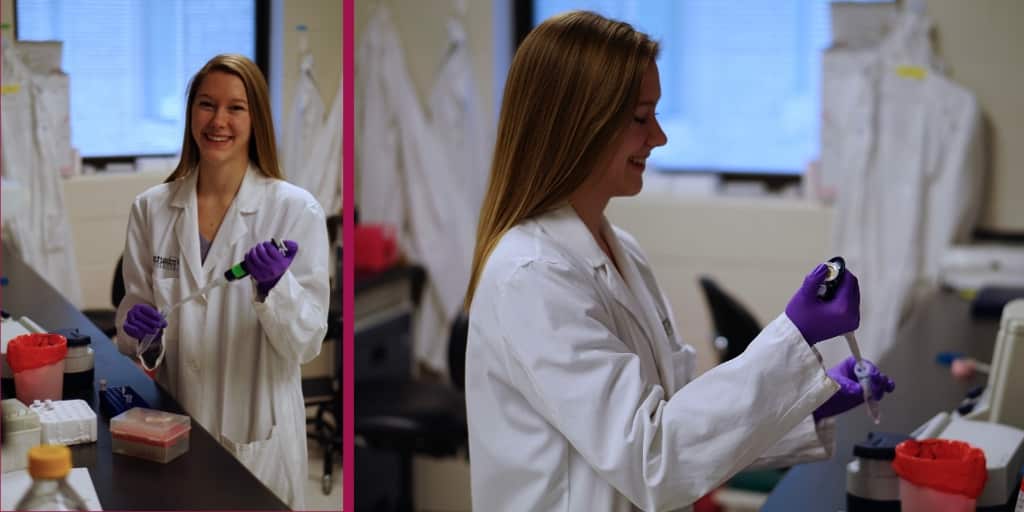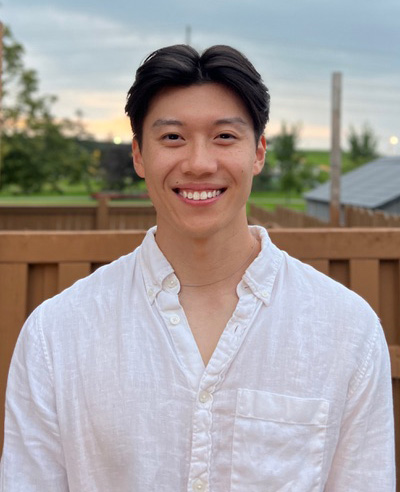1. Who are you? Tell us about yourself.
My name is Veronica Dubois. I recently completed my Bachelor of Medical Science (BMSc) degree in Medical Biophysics at Western University. I am currently a first year Masters of Science graduate student in Medical Biophysics at Western University working under the co-supervision of Dr. John Ronald and Dr. Paula Foster.
2. Why is the TBCRU Studentship Award important to you?
This award has allowed me to meet like-minded students that are engaged in translational breast cancer research. The opportunity to come together as a team to fundraise and talk about science has been a reminder of why we dedicate our time to this research and has furthered my knowledge in the field. I really appreciate that this award has allowed me to put more time and resources into my project.
3. Tell us about your research. What are you doing and what problems do you hope to solve?
My research focuses on developing techniques to study a new kind of cancer therapy called chimeric antigen receptor T (CAR-T) cell therapy. This type of therapy involves collecting immune cells from a patient, attaching a protein that helps them to find and kill cancer cells, then placing these “trained” immune cells back into the patient where they can travel through the body and fight the patient’s cancer more effectively.
Currently, this cancer treatment holds great promise, but is limited because it can cause serious side effects and is unable to effectively treat solid tumours like breast cancer. My research is developing methods to track CAR-T cells after they have been injected into the body using different imaging techniques. This will allow us to determine their location, relative number, and viability during breast cancer treatment. We hope this will be useful for learning more about the treatment side effects and for studying new CAR-T cell therapies that will target breast cancer more effectively.
4. Why is your research important? How can your research be applied in the real world?
My research is important because improvements to current CAR-T cell therapies could transform the way that breast cancer is treated. To improve these therapies we need to address the side effects that are limiting the use of this therapy and create an effective CAR-T cell against solid tumours such as breast cancer.
These problems will be much easier to address with methods to monitor the CAR-T cells in the body and that is what I will accomplish with my project. In the short term, the development of this cell tracking method will provide researchers with a method to study novel CAR-T cell therapies that may be able to treat breast cancer and decrease side effects. In the long term, we hope this project will provide a method for clinicians to track CAR-T cells in breast cancer patients to determine if the cell injection was effective and if the patient will respond to the treatment earlier.
5. What inspired your research?
Our lab is focused on developing methods for cellular and molecular imaging. We heard about the exciting potential for CAR-T cell therapies to treat a variety of cancers and found that the limitations of this therapy could be more easily addressed if cell tracking methods existed. For this reason, we decided that our objective would be to develop molecular imaging methods for monitoring the fate of CAR-T cells in the body of breast cancer patients.
6. Why are you passionate about breast cancer research?
Cancer touches everyone’s lives at one point or another. For me, my first encounter with cancer was when my childhood best friend was diagnosed with osteosarcoma. Ever since that day I have had an interest in cancer, so I was very happy to be given the chance to do cancer research. I am particularly interested in breast cancer because research works toward better patient care and has the potential to help so many people.
7. Why do you think breast cancer research matters?
Breast cancer research matters because it has the potential to save so many lives. Research done every day pushes to improve patient outcomes and make treatments as effective and non-toxic as possible. I think it is really important that breast cancer research gives hope to everyone who has a loved one that has received a breast cancer diagnosis and/or helps those that will be diagnosed in the future.
8. What excites you about your work?
I love that research allows us to create new technologies and find new information that can lead to better outcomes for patients with breast cancer. I am excited to work with a cancer cell therapy that may one day change the way we treat cancer, and I hope that my research can be a piece of the greater puzzle that allows that to be a reality.
9. What do you see yourself doing in the future?
In the future I would like to complete my PhD on a project that will continue to contribute to positive treatment outcomes for patients with breast cancer. After graduation I hope to work with cell therapies to help make this treatment a reality in hospitals everywhere.
10. What do you like to do when you aren’t working on research?
When I am not working on research, I enjoy playing hockey, running, and going to the dog park with my puppy.
Support researchers like Veronica Dubois by considering a donation to the Breast Cancer Society of Canada. Find out how you can help fund life-saving research, visit bcsc.ca/donate




